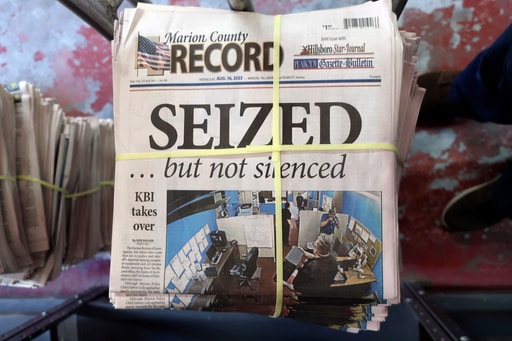TOPEKA, Kan.
By JOHN HANNA and HEATHER HOLLINGSWORTHAssociated Press
A rural Kansas county has agreed to pay more than $3 million and apologize over a law enforcement raid on a small-town weekly newspaper in 2023. Eric Meyer, editor and publisher of the Marion County Record, said Tuesday he hoped Marion County’s payment would deter similar actions against other news organizations in the future. The raid sparked an outcry over press freedom and prompted five federal lawsuits. County sheriff’s officers were involved in the raid and helped draft search warrants Marion city police used to enter the newspaper’s offices and other locations. Meyer’s 98-year-old mother, co-owner of the paper, died of a heart attack the next day, something the publisher blamed on the stress of the raid.
TOPEKA, Kan. (AP) — A rural Kansas county has agreed to pay a little more than $3 million and apologize over a law enforcement raid on a small-town weekly newspaper in August 2023 that sparked an outcry over press freedom.
Marion County sheriff's officers were involved in the raid on the Marion County Record and helped draft search warrants used by Marion city police to enter the newspaper's offices, the publisher's home and the home of a local city council member.
“They intentionally wanted to harass us for reporting the news, and you’re not supposed to do that in a democracy,” the editor and publisher, Eric Meyer, said Tuesday. He added he hoped the payment was large enough to discourage similar actions against other news organizations in the future.
The raid prompted five federal lawsuits against the county, the city of Marion and local officials. Meyer's 98-year-old mother Joan, the paper's co-owner, died of a heart attack the next day, something he blames on the stress of the raid.
During the raid, authorities seized cellphones and computers from the newsroom and rifled through reporters’ desks. Search warrants linked the raid to a dispute between a local restaurant owner and the newspaper, which had obtained a copy of her driving record while reporting on her request for a city liquor license. The raid also came after the newspaper had dug into the background of the police chief at the time who led the raid.
The raid triggered a national debate about press freedom focused on Marion, a town of about 1,900 people set among rolling prairie hills some 150 miles (240 kilometers) southwest of Kansas City, Missouri. Police body camera footage from Meyer’s home showed his mother, who lived with him, visibly upset and telling officers, “Get out of my house!”
An attorney for the newspaper, Bernie Rhodes, released a copy Tuesday of the five-page agreement resolving legal claims against the county. Claims against the city and city officials have not been settled, and Meyer said he believes they will face a larger judgment once those claims are eventually resolved.
Marion County's administrator and attorneys for the city and county did not immediately return messages seeking comment.
Under the judgment, the estate of Meyer's mother will receive $1 million. Meyer, two former Record reporters and the paper's business manager will split $1.1 million, and Ruth Herbel, the former city council member, will receive $650,000. Meyer said he's considering a fund to ensure that the paper remains financially viable or a program to encourage young journalists to work in communities like his.
“The goal isn’t to get the money. The money is symbolic,” Meyer said. “The press has basically been under assault.”
Three days after the raid, the local prosecutor said there wasn't enough evidence to justify it. Experts said Marion's police chief at the time, Gideon Cody, was on legally shaky ground when he ordered it, and a former top federal prosecutor for Kansas suggested it might have been a criminal violation of civil rights.
Doug Anstaett, a retired Kansas Press Association executive director, said Tuesday that the raid violated the state's shield law for journalists. It allows law enforcement agencies to seek subpoenas to obtain confidential information from news organizations but requires them to show a compelling interest and that they can’t obtain it in another way. Anstaett was the association's executive director when the law was enacted in 2010.
The Record is known for its aggressive coverage of local issues, and Anstaett suggested police where trying to “get at” Meyer because of his adversarial relationships with local officials, adding, “it totally backfired.”
“They didn’t follow any of those requirements and therefore it was really a slam dunk in terms of whether they broke the law or not,” he said.
Genelle Belmas, a University of Kansas professor who teaches media law, described the raid as “an egregious violation of the First Amendment rights” of Meyer and the weekly.
“I share his hope that an award of this size serves as a deterrent against future ill-conceived warrants with political motivations," she said. "And no amount of money brings Joan Meyer back. We need to stay vigilant against government incursions on the press.”
The search warrants were premised on the idea that the newspaper and a reporter had illegally impersonated the local restaurant owner to obtain her driving record online and that the former city council member Herbel illegally circulated it by sending a cellphone screenshot to the city manager.
Two special prosecutors who reviewed the raid and its aftermath said nearly a year later that the Record, its staff and Herbel had committed no crimes before the raid. The prosecutors also said the warrants signed by a judge contained inaccurate information from an “inadequate investigation” and that the searches were not legally justified. Cody resigned as police chief in October 2023.
Cody is scheduled to go to trial in February in Marion County on a felony charge of interfering with a judicial process, accused by the two special prosecutors of persuading a potential witness to withhold information from authorities investigating his conduct. He had pleaded not guilty and did not respond to a text message Tuesday seeking comment about the county's agreement.
The charge against Cody stems from text messages between him and the business owner after the raid. The business owner has said Cody asked her to delete text messages between them, fearing people could get a wrong idea about their relationship, which she said was professional and platonic.
The Marion County Commission approved the agreement Monday after discussing it in private for 15 minutes.
The agreement required Sheriff Jeff Soyez to issue an apology.
“The Sheriff’s Office wishes to express its sincere regrets to Eric and Joan Meyer and Ruth and Ronald Herbel for its participation in the drafting and execution of the Marion County Police Department’s search warrants on their homes and the Marion County Record," the sheriff's statement said.
___
Hollingsworth reported from Mission, Kansas.





